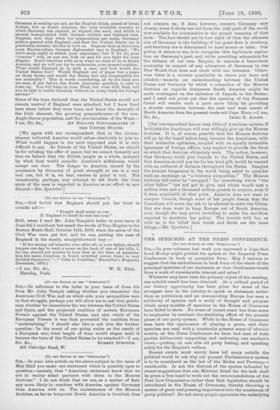[TO THE EDITOR Of TEN "SPECTATOR "] SIR,—In your able article
on the above subject in the issue of May 22nd you make one statement which is possibly open to question,—namely, that "American statesmen know that we are in reality silent partners with them in the Monroe doctrine." I do not think that we are, as a matter of fact, any more likely to combine with America against Germany than America with us. The maintenance of the Monroe doctrine, as far as temperate South America is involved, does not concern us; it does, however, concern Germany very closely, since it shuts her out from the only part of the world now available for colonisation in the proper meaning of that term. The fact should not be lost sight of that the ultimate aim of Germany in the building of her great fleet is territory, and territory she is determined to have sooner or later. Our policy, it seems to me, is to recognise this legitimate aspira- tion on Germany's,part, and, while providing adequately for the defence of our own Empire, to exercise a benevolent neutrality in respect of any adventure of Germany in the New World that does not clash with our interests. Other- wise there is a sinister possibility to which you have not alluded,—namely, an understanding between the United States and Germany by which a relaxation of the Monroe doctrine as regards temperate South America might be made contingent on the inclusion of Canada in the States: and I need not point out that the opening of the Panama Canal will render such a pact more likely by providing a shorter connexion between the east and west coasts of North America than the present route via Cape Horn.—I am, [Oar correspondent knows very little of American opinion if he thinks the Americans will ever willingly give up the Monroe doctrine. It is, of course, possible that the Monroe doctrine will go by the board before long, because the Americans, with their invincible optimism, coupled with an equally invincible ignorance of foreign affairs. may neglect to provide the force on which that doctrine ultimately rests. The notion, however, that Germany could give Canada to the United States, and that America should pay her for her kind gift, would be treated with an outburst of derision throughout the States. Imagine the keenest bargainers in the world being asked to consider such an exchange as "a business proposition." The Monroe doctrine will never be " swapped " for something which "the other fellow" has not got to give, and which would cost a million lives and a thousand million pounds to acquire, even if it were acquirable at that price. America does not want to conquer Canada, though some of her people dream that the Canadians will some day ask to be allowed to enter the Union. But she does want to keep Europe out of South America, even though she may prove unwilling to make the sacrifices required to maintain her policy. The trouble with her, as with us, is the belief that words and deeds are the same things.—ED. Spectator.]










































 Previous page
Previous page